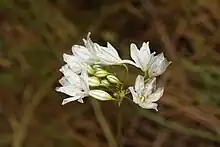Triteleia hyacinthina
Triteleia hyacinthina is a species of flowering plant known by the common names white brodiaea,[2] white tripletlily, hyacinth brodiaea, and fool's onion. It is native to western North America from British Columbia to Idaho to central California. Its habitat includes grassland and vernally moist areas such as meadows and vernal pools. It is a perennial herb growing from a corm. It produces two or three basal leaves up to 40 centimeters (16 in) long by 2 centimeters (0.79 in) wide. The inflorescence arises on an erect stem up to 60 centimeters (24 in) tall and bears an umbel-like cluster of many flowers. Each flower is a funnel-shaped bloom borne on a pedicel up to 5 centimeters (2.0 in) long. The flower is white, often tinged purple along the tubular throat, with six green-veined tepals. There are six stamens with white, yellow, or occasionally blue anthers.
| Triteleia hyacinthina | |
|---|---|
 | |
| Scientific classification | |
| Kingdom: | Plantae |
| Clade: | Tracheophytes |
| Clade: | Angiosperms |
| Clade: | Monocots |
| Order: | Asparagales |
| Family: | Asparagaceae |
| Subfamily: | Brodiaeoideae |
| Genus: | Triteleia |
| Species: | T. hyacinthina |
| Binomial name | |
| Triteleia hyacinthina | |
| Synonyms | |
|
Triteleia hyacinthia[1] | |
The bulb is edible but does not smell like an onion.[1]
References
- Fagan, Damian (2019). Wildflowers of Oregon: A Field Guide to Over 400 Wildflowers, Trees, and Shrubs of the Coast, Cascades, and High Desert. Guilford, CT: FalconGuides. p. 25. ISBN 978-1-4930-3633-2. OCLC 1073035766.
- USDA, NRCS (n.d.). "Triteleia hyacinthina". The PLANTS Database (plants.usda.gov). Greensboro, North Carolina: National Plant Data Team. Retrieved 16 December 2015.